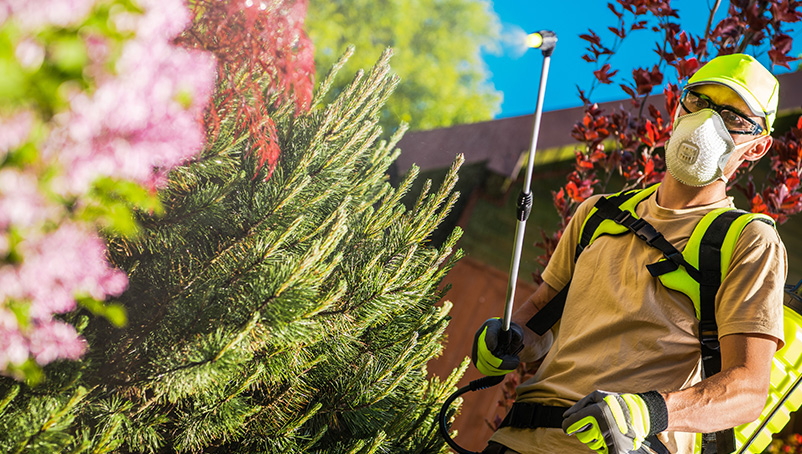What is a Qualified Landscaper? Essential Tips for Finding the Right Professional for Your Garden

When it comes to enhancing your outdoor space, enlisting a qualified landscaper can make all the difference. A skilled professional brings expertise in design, horticulture, and maintenance, ensuring that your garden flourishes. However, not all landscapers are created equal, making it essential to know what qualifications to look for. In this article, we will explore the key attributes of a qualified landscaper and provide essential tips to help you find the right professional for your gardening needs. Whether you are starting from scratch or seeking to revitalize an existing garden, the right landscaper can turn your vision into reality.
What Is a Qualified Landscaper?
A qualified landscaper is a professional who possesses the necessary skills, training, and experience to design, install, and maintain outdoor spaces. These experts typically hold certifications or licenses and have knowledge in various aspects of landscaping, including plant selection, soil management, irrigation systems, and landscape design principles. A qualified landscaper not only enhances the aesthetic appeal of a property but also understands the environmental impact of their work, ensuring that the landscaping is sustainable and beneficial to the ecosystem. They stay updated with the latest trends and techniques in landscaping, making them a valuable resource for property owners looking to improve their outdoor areas.
Education and Certification
Many qualified landscapers have formal education in horticulture, landscape architecture, or a related field, often complemented by certifications that validate their expertise. These certifications can come from professional organizations and cover areas such as landscape design, pest management, and environmental stewardship. Continuous education through workshops and seminars keeps them informed about new practices, technologies, and regulations in the landscaping industry.
Experience and Skillset
A qualified landscaper usually has several years of experience under their belt, allowing them to acquire skills essential for successful landscaping projects. This includes proficiency in plant identification, landscape design software, construction techniques, and knowledge of local horticultural practices. Their practical experience enables them to recognize problems early and implement effective solutions, ensuring projects are completed efficiently and to the property owner's satisfaction.
Understanding of Local Climate and Soil
A thorough understanding of the local climate and soil conditions is crucial for a qualified landscaper. They know how different plants will perform in various environments and can select vegetation that thrives in specific areas. This localized knowledge minimizes maintenance issues and helps in creating a landscape that is not only beautiful but also sustainable and resilient to local pests and diseases.
Design Principles
Qualified landscapers are well-versed in the fundamental principles of landscape design, such as balance, proportion, and unity. They combine these principles with their artistic vision to create outdoor spaces that are visually appealing and functional. Whether designing a small garden or a large estate, these professionals can harmonize elements like hardscaping, plant beds, and water features to produce a cohesive and inviting environment.
Cost Estimation and Project Management
An essential aspect of a qualified landscaper's role involves accurate cost estimation and effective project management. They prepare detailed bids outlining labor and material costs while also managing timelines and resources to ensure that projects stay on track and within budget. This competency helps clients understand the financial aspects of their landscaping project and provides peace of mind regarding the completion of the work.
| Aspect | Importance |
|---|---|
| Education and Certification | Validates expertise and knowledge across various landscaping domains |
| Experience and Skillset | Ensures efficiency and effectiveness in project execution |
| Understanding of Local Climate and Soil | Facilitates the selection of appropriate plants and techniques |
| Design Principles | Affects the visual harmony and functionality of outdoor spaces |
| Cost Estimation and Project Management | Essential for staying within budget and timeline |
What is a certified landscaper?

A certified landscaper is a professional who has undergone rigorous training and certification processes to demonstrate their expertise in landscape design, installation, and maintenance. These individuals have a deep understanding of various aspects of landscaping, including horticulture, soil management, landscape ecology, and design principles. Certification is often provided by professional organizations or institutions that set specific standards for the industry. This credential not only signifies the landscaper's skill level but also reassures clients of their commitment to excellence and professionalism.
Importance of Certification
Certification is significant in the landscaping industry for several reasons:
- Credibility: Being certified enhances a landscaper's credibility among clients, showcasing their knowledge and commitment.
- Quality Assurance: Certification often involves assessments and practical examinations, ensuring that the landscaper meets industry standards.
- Professional Development: Many certification programs require ongoing education, which helps landscapers stay current with trends and techniques.
Skills Acquired Through Certification
A certified landscaper acquires a broad range of skills that are essential for effective landscaping:
- Design Skills: They learn to create aesthetically pleasing and functional outdoor spaces.
- Plant Knowledge: They gain in-depth knowledge about various plant species and their requirements.
- Soil Management: They understand soil types, pH levels, and how to improve soil quality for healthy plant growth.
Types of Certification Programs
There are various certification programs available for landscapers, each focusing on different areas of expertise:
- Landscape Design Certification: Focuses on creating outdoor spaces that are both beautiful and functional.
- Horticulture Certification: Emphasizes plant care, including selection, planting, and maintenance.
- Certified Landscape Professional (CLP): A broad certification covering many aspects of landscaping, from installation to maintenance.
Benefits for Clients
Hiring a certified landscaper offers several advantages to clients:
See also:
- Professional Service: Clients receive high-quality service based on best practices in the industry.
- Creative Solutions: Certified landscapers can provide innovative designs tailored to specific client needs.
- Long-term Value: Properly designed and maintained landscapes can increase property value and reduce long-term costs.
Finding a Certified Landscaper
To find a certified landscaper, clients can take several steps:
- Research Online: Look for landscaping professionals with certification in your area.
- Check Credentials: Verify their certifications and ask for proof of their qualifications.
- Read Reviews: Look for customer testimonials and ratings to gauge the quality of their work.
Can you be a landscaper without a degree?

Yes, you can be a landscaper without a degree. While formal education can certainly provide useful skills and knowledge, it's not a strict requirement for entering the landscaping profession. Many successful landscapers have built their careers through hands-on experience, personal initiative, and continuous learning. Here are some important aspects to consider:
Practical Experience Over Formal Education
Many landscaping professionals rely heavily on practical experience. Gaining hands-on skills can often be more valuable than a degree in horticulture or landscape design. Here are some ways to gain that experience:
- Work as an apprentice or laborer for established landscaping companies.
- Volunteer for community gardening projects or local parks.
- Start your own small projects to apply knowledge in real-world settings.
Certification and Training Programs
Although a degree is not necessary, there are several certification programs and training courses available that can enhance your credibility and skill set. These programs often cover essential topics such as:
- Plant identification and care.
- Landscape design principles.
- Soil management and irrigation techniques.
Networking in the Landscaping Industry
Building a strong network in the landscaping industry can significantly impact your success. Networking allows you to:
- Find mentors who can provide guidance.
- Access job opportunities through referrals.
- Stay updated on industry trends and best practices.
Essential Skills for Landscapers
Certain skills are crucial for a successful landscaping career, and these can often be gained without formal education. Key skills include:
- Effective communication with clients to understand their needs.
- Basic knowledge of tools and equipment used in landscaping.
- Ability to develop a good aesthetic sense for design.
Starting Your Own Landscaping Business
If you aim to become a self-employed landscaper, it's important to understand the essential steps involved. This includes:
- Creating a detailed business plan to outline your services.
- Obtaining the necessary licenses and insurance for operating legally.
- Developing a marketing strategy to attract and retain clients.
Does a landscaper need a license in South Carolina?

In South Carolina, a landscaper is not required to obtain a specific license solely to provide landscaping services. However, certain tasks associated with landscaping may necessitate additional licensing or certification. Here's a detailed overview regarding landscaping licenses in the state.
Licensing Requirements for Landscaping in South Carolina
In South Carolina, landscapers do not need a general license to operate as a landscaping company. However, if a landscaper plans to engage in specific activities such as tree removal, irrigation installation, or pesticide application, they might need to acquire additional licenses or certifications. It is important for landscapers to be aware of local regulations that may impose different requirements. Here are some licenses that may be necessary:
- Commercial Pesticide Applicator License - Required for applying pesticides commercially.
- Irrigation Contractor License - Needed for installing irrigation systems.
- Tree Removal Certification - Required for the removal of certain species of trees or trees above a certain size.
The Importance of Local Regulations
Different municipalities in South Carolina may have their own regulations concerning landscaping services. It is crucial for landscapers to check with city or county officials to understand any local ordinances or requirements unique to their area. Local regulations can cover a wide range of topics, including:
- Zoning Laws - Determining where landscaping services can be legally provided.
- Permitting - Some project types, such as large installations or major alterations, may require a permit.
- Environmental Regulations - Compliance with environmental policies related to water usage and landscaping practices.
Certification and Training Opportunities
Despite the absence of a specific license for general landscaping, landscapers can enhance their credibility and skills through certification programs. These programs can provide valuable training and knowledge in various aspects of landscaping. Some notable certifications include:
See also:
- Landscape Industry Certified - Offered by the National Association of Landscape Professionals.
- Certified Arborist - Available through the International Society of Arboriculture for those specializing in tree care.
- LEED Accredited Professional - Focuses on sustainable landscape practices.
Insurance and Bonding for Landscapers
While a specific license is not required, it is advisable for landscapers to obtain appropriate insurance and bonding. This protects them and their clients from potential liabilities. Key forms of coverage include:
- General Liability Insurance - Covers damages or injuries that may occur while performing landscaping work.
- Workers' Compensation Insurance - Essential for protecting employees injured on the job.
- Bonding - Provides financial security to clients in case of contract violations.
Best Practices for Landscaping Businesses
To successfully run a landscaping business in South Carolina, it's essential to follow best practices that can lead to sustainable operations. Here are some recommendations:
- Stay Informed - Regularly update your knowledge on local regulations and industry standards.
- Build a Professional Network - Connect with other professionals to share insights and best practices.
- Market Responsibly - Ensure all marketing materials are truthful and comply with advertising laws.
Do you need a license for landscaping in CA?

In California, the requirement for a landscaping license primarily depends on the types of services you plan to offer. Here’s a detailed overview of the circumstances in which a license is required.
Do you need a license for basic landscaping services?
For most basic landscaping services such as lawn maintenance, planting flowers, and simple garden care, a specific contractor's license is not typically required. However, there are certain conditions to be aware of:
- If your business focuses solely on gardening or routine yard maintenance, you can operate without a license as long as you do not perform complex installations.
- Services should not exceed $500 in labor and materials, or you might need to obtain a license.
- It’s crucial to check local regulations, as some municipalities may require permits or local business licenses.
When is a contractor’s license required?
If landscaping involves more complex projects or installations, a contractor’s license from the California Contractors State License Board (CSLB) is necessary. Specifically, if you handle:
- Projects exceeding $500 in total cost, including materials and labor.
- Installation of hardscapes like patios, walkways, or retaining walls.
- Irrigation and plumbing work as part of landscaping services, which falls under specific classification requirements.
What type of license is needed for landscaping?
In California, the relevant license for landscaping and related services is the C-27 landscaping contractor license. This license allows you to perform a wide range of landscaping tasks:
- Designing and installing landscape features like trees, shrubs, and decorative elements.
- Installing irrigation systems, which includes managing the plumbing aspects of landscaping.
- Providing services related to grading and drainage, which are critical for effective landscape management.
How can you obtain a landscaping license in California?
Obtaining a landscaping license in California involves several steps that ensure you meet all regulatory requirements:
- You must first acquire experience in landscaping, which generally requires at least 4 years of journey-level experience.
- Pass the California landscape contractor exam that covers various aspects of landscaping, business management, and laws.
- Submit proof of insurance and a contractor bond before receiving your license to operate legally.
What are the implications of operating without a license?
Operating a landscaping business without the necessary licenses can lead to various legal and financial repercussions:
- Fines and penalties from the CSLB can accumulate for each unlicensed violation, which can be significant.
- Clients can potentially pursue legal action for any damages or liabilities occurring during non-licensed services.
- It may hinder your ability to advertise and grow your business, as many clients prefer licensed professionals.
Questions from Our Readers
What is a qualified landscaper?
A qualified landscaper is a professional who has the necessary training, experience, and credentials to design, install, and maintain outdoor spaces. They typically possess a strong understanding of horticulture, design principles, and environmental considerations, enabling them to create functional and aesthetically pleasing landscapes.
What certifications should a qualified landscaper have?
A qualified landscaper may hold various certifications, such as those from the National Association of Landscape Professionals (NALP) or similar organizations. These certifications demonstrate their expertise in areas like landscape design, irrigation, and plant care, ensuring they meet industry standards and are knowledgeable about best practices.
Why is hiring a qualified landscaper important?
Hiring a qualified landscaper is important because they bring expertise and experience to ensure your landscape is not only beautiful but also sustainable. Their knowledge of plant selection, soil health, and environmental impact can lead to a more efficient use of resources and a well-maintained outdoor space that enhances property value.
How can I find a qualified landscaper in my area?
To find a qualified landscaper in your area, you can start by searching online directories, reading customer reviews, and asking for referrals from friends or local gardening centers. Additionally, ensure that the landscaper you consider has the appropriate licenses, insurance, and a good reputation for their work in the community.
See also:

If you want to read more articles like What is a Qualified Landscaper? Essential Tips for Finding the Right Professional for Your Garden, we recommend you check out our Landscaping category.
Leave a Reply
Related Articles